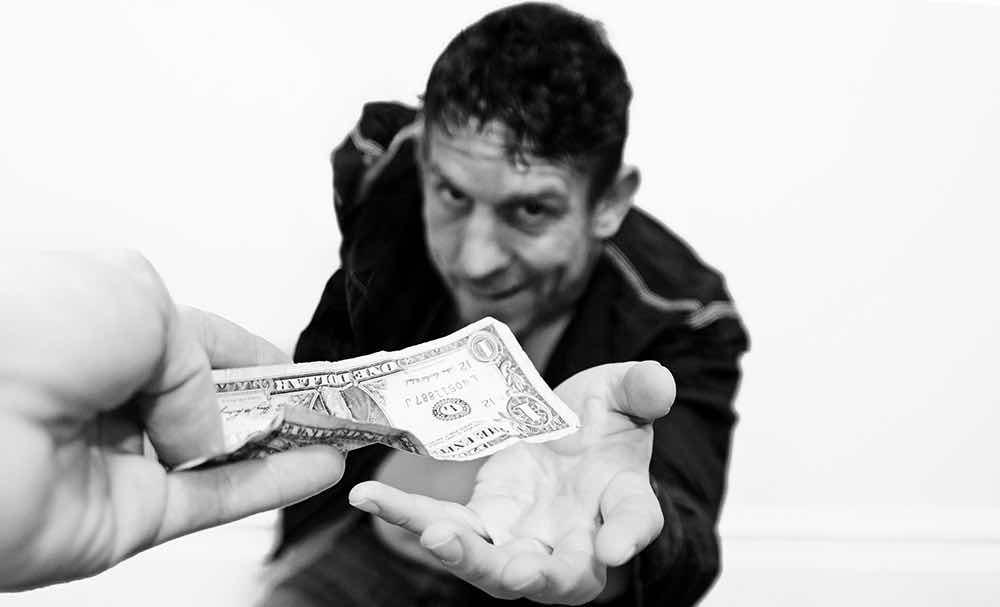We live in a truly unique time to be musicians. The internet has so dramatically altered the landscape that those who dominated the horizon as recently as a decade ago barely recognise it anymore. I cut my teeth on the music scene back when the social utility of the internet was barely more than a few MySpace pages and MSN screen names, and it was common knowledge that the only way to ‘make it’ in this business was to land a major record deal. To put it simply, it was the kind of pursuit that was regarded as little more than an airy pipe dream, and to believe otherwise was to be very foolish indeed.
The internet exploded the myth that the only way to be successful in this world was through some ineffable brand of divine selection. It proved that actually, despite that pervasive miasma of common, patronising knowledge, you could achieve great things as a creative, and that like anything else in life, the way to do that was through that tried-and-true method of focused, dedicated work on proven strategies. Data doesn’t lie, but insecure people do.
The problem of course is that finding that winning strategy in this golden age of music marketing democracy isn’t easy, and it can take the burgeoning artist years to develop the craft – assuming they even stick it out long enough to get that far. Whereas before the path to greatness was one sprawling landscape that only the chosen few were guided across by that benevolent hand of the major label, the internet explosion has rendered it a treacherous wasteland, riddled with sinkholes, precipitous drops, and a wide selection of predators. These days anyone can cross, but they do so at their own peril.
Anyone who loves a good apocalypse knows that such environments breed the absolute worst kinds of people, and the internet is rife with total pieces of filth willing to unscrupulously trick the bright-eyed aspirant into, at best, buying their particular brand of snake oil, or else trying to lure them down into some dark cave for nefarious purposes best not spoken of.
Starting out on my own after years of enjoying the collective benefits (and enduring the constant compromise) of rolling with a pack, I of course fell prey to many of the pitfalls that scatter this desolate landscape. Looking back, I’ve made some pretty cringeworthy mistakes. Luckily, I’ve learnt from those mistakes, and now I’m here to help you avoid making them at all.
Here are the five things I wish I’d known when I started my music career. You’re welcome.
1/ Your Audience Is All That Matters

Photo by Justice Amoh on Unsplash
One of my favourite episodes of Peep Show involves Mark getting his book ‘published’ by a clearly disreputable agent, and despite insisting that this was all very legitimate, he’s eventually forced to accept that the books are just print-outs. Throughout the episode Jeremy tries to life-coach Mark into accepting that this whole enterprise is just one big vanity trip, and it’s clear from the outset that Mark knows this deep down and is simply refusing to admit it to himself.
Mark’s experience is a perfect cautionary tale for the artist just starting out. You’re going to be tempted to dive right in and try and rack up those page likes, video views and song streams. You’re not going to feel like you’re a real artist until you have some social capital to wave in peoples’ faces. And, soon enough, you’ll realise that this really isn’t as easy as simply uploading your content and waiting for the magic to happen.
The frustration you feel at seemingly being unable to move the needle will no doubt send you into a frenzied fact-finding mission, and the fruits of those google searches will yield promises such as ‘Grow Your Follower Count Instantly!’ and ‘100% Real, Definitely Not Fake Fans For You!’
These claims contain as much substance as those that insist there are hot singles in your area just waiting to meet you, and yet you’ll blinker yourself to this obvious mischief as you find yourself getting honey-trapped by claims that basically admit that what they’re offering is fake likes from fake or pay-rolled accounts. They’ll make assertions like ‘you can’t get anywhere without appearing like you have a loyal fanbase, so use these fake likes to trick people into believing you’re somebody worth paying attention to.’ I’m paraphrasing of course, but this is basically the mythology that these cheeky little scamps are trying to sell to us.
The thing is, yes, you can buy Spotify streams and Insta followers and YouTube subs, but what are they if they don’t lead to meaningful audience interaction? ‘Vanity, all is vanity,’ as Mark would later lament about his botched attempt at becoming a published author. Vanity metrics might make you look the part, but anyone with half a brain will be able to scratch beneath the surface and see it’s all just smoke and mirrors. Buying social validation is the equivalent to kitting yourself out in that stupidly expensive gym gear everyone’s spending their money on now because one of the Kardashians said ‘this is alright innit’, paying for a membership at your local leisure centre, and then sitting in the cafe wondering when the pounds are going to start falling off. In the end, everyone will realise that it’s all just an act, and you’ll look like a buffoon.
The only thing you should ever be worried about (assuming you can produce solid content and are actually, y’know, talented) is cultivating meaningful connections with your audience. Just one paying customer is worth a thousand page likes, because at this stage in your career, that one customer is your sole investor.
“You need to seek ways to interact in meaningful ways with the people who take an interest in what you do, and in a way that seeks to add value to their lives instead of always screaming ‘ME ME ME!’ at people—which you’re doing any time you say ‘so excited to share this track with you all’, btw. People don’t care if you’re excited, they care about how the track will affect them on their personal journey of self-discovery. Just a little pro-tip for you there.”
Focus on your audience, and not on how many 1s and 0s are displaying on your particular little bit of html. The true metric of success is how many people would be willing to support you with meaningful actions that actually make your ambition possible, not the number of people dropping high fives and fire emojis all over the place.
2/ If It’s Too Good To Be True, It Probably Is

Photo by Jamie Street on Unsplash
A hard and fast rule of life is that nothing of value happens easily—if it was so easy, then everyone would do it, and then it wouldn’t be valuable anymore, would it? Nowhere is this more true than it is in the music industry. Anything meaningful that happens in this world is the product of dedication, hard work, and a slight twinge of insanity. We all know this, it’s fundamental, yet that doesn’t stop those sneaky snake oil merchants sidling up to us all the same, with offers that are blatantly too good to be true.
There’s a wide variety of nonsense wares being peddled out there, but one I find so ridiculous as to be laughable is the ‘pay us £20 and we’ll put you in our blog’ racket being run by more than a few nefarious folk. It certainly seems like a great deal for you, the artist; £20 is relatively little for most people in a position to be legitimately trying to build a music career, and as they say in showbiz, there’s no such thing as bad publicity.
The thing is, you have to question the quality of a publication that will accept absolutely any music so long as it meets this criminally low threshold for acceptance. You can imagine what sort of awful cack gets smeared across the front pages of these blogs’ homepages. It’s the kind of stuff that makes Britain’s Got Talent or American Idol look like the benchmarks of high-brow artistry.
So what? you tell yourself. It still means more eyes on me and my music, even if it’s only a few.
But therein lies the pinch. No serious music fan reads these sorry excuses for music journalism. You’re essentially spending a solid week of advertising on shouting your name into a cacophony of others doing the exact same, with absolutely nobody being able to hear anything over the deafening sound of their own self-serving rhetoric. Because trust me, there’s nobody else there to hear the message. Imagine a market place where everyone sets up a stall and then desperately tries to sell their wares to a bunch of mannequins. And to top it off, the mannequins aren’t even particularly interested.
Think about it like this: would you appreciate a compliment if you paid somebody to say it? It’s the same feeling. You know you’re not being written about on merit, and most of the time these ‘reviewers’ just go in and copy and paste whatever you’ve written about your track in your submission email anyway. It’d take one seriously smug cat to pay to read their own words back to themselves and go ‘yeah, I wholeheartedly agree: this track IS both unique and familiar, couldn’t have said it better myself!’
The moral of this story? There are ways to spend money and get yourself out there, and you will have to employ some of these tactics if you want to take this pursuit seriously. But paying your way onto blogs with virtually no quality control and a sickeningly low barrier to entry is definitely not one of them. Avoid at all costs.
3/ Accelerators Are For Cars, Bots Are For The Lab
At some point or another, you’re going to roll into the mysterious world of internet advertising. The very thing that makes the internet age the game-changer for the independent musician, social media marketing is where employing those smart strategies and hard work is really going to make a difference to your career, and the better you get at it, the more results you’ll reap.
Of course, like with everything else we’ve discussed, you’re going to have to wade through some swamps to get to the promised land. And this is where you need to tread the most carefully, because some of the most cleverly concealed tomfoolery is being exuded in this arena, and it’s so insidious that sometimes even the ones perpetuating it don’t realise how they’ve been infected by it. Pay close attention here, because internet ads can be a double-edged sword, and if you don’t know what you’re doing, you can trap yourself in a money pit quicker than you can say ‘is $5 an acceptable cost per result?’
There’s a lot we could discuss here, but I’m just going to talk about one phenomena that I feel is emblematic of the general problem: ‘the social accelerator.’ The essential premise is that you’re a small channel, and you need to grow. But growing by advertising yourself to ‘big ticket’ countries is expensive, because there’s an immense number of people doing the exact same, some of them with budgets that would embarrass entire nations. You need to fish in less crowded waters, snap up some penny stocks, and build up that all important (read: drastically over-emphasised by those who stand to profit from this enterprise) social proof so that people will consider your channel legitimate.
This technique, though I use that term loosely, is considered an ‘accelerator’ because it can yield tens of thousands of page likes in as little as one week, sooner if you juice the ad budget even more. The idea is that you send your ad post to regions where the advertising competition isn’t so fierce, build up some momentum to ‘trick the algorithm’ (which we won’t go into, but just to be clear, you can’t trick it so don’t try), before switching over to those all-important consumerist nations. Armed with a post bristling with social approval, the people who are likely to stream your track, buy your stuff, and generally just, consume, whatever you stick in front of them, will now be primed to do so because apparently all they care about is the fact your content has been shared over 800 times.
The problem with this is that not all social proof is created equal, and while it’s good to have a healthy looking amount of likes, comments and shares on your material, the source of that validation is just as important as the quantity. Besides, most people aren’t idiots and will be able to decide for themselves whether they like a video or song or not, regardless of how many thumbs have been stuck up it prior to its arrival on their newsfeed.
What’s so bad about advertising to say, India, or Malaysia, hm? you might ask. Surely a diverse fanbase is a good thing, especially if I want cool places to go to on tour. Maybe the people who are advising against advertising here just don’t want people with names they can’t pronounce clogging up their posts. Maybe it’s just a racism thing. After all, I can look on these profiles, and they all look like real people to me! A fan is a fan, who cares where they’re from? Maybe if you just got YOUR HEAD OUT OF YOUR SMALL-MINDED, ENTITLED…
Woah there! I had these same thoughts too, and for good reason. A fan IS a fan, and there are certain places in the world that make perfect sense to want to have a fanbase. The problem is that in a lot of these cheap-to-advertise-to countries, you can’t guarantee a fanbase, because you can’t guarantee that your ad is reaching a potential fan at all. The practice of click-farming is rife in a number of regions in the world, which in a nutshell is essentially battery farming for internet marketing. It utilises huge swathes of underpaid workers who go hell-for-leather clicking on anything that moves, in a bid to artificially inflate the engagement levels of various ad posts. So caught up in the heat of it all, your content gets targeted too. The reason these accelerators are so effective is because there’s so much of this going on that all you have to do is dangle your content like a blood soaked rag in shark-infested waters, and wait for the carnage to ensue.
You can tell if you’ve been farmed by measuring the quality of the engagement you receive from your new-found fans. Trying to engage and nurture beyond gathering superficial metrics like post likes and comments, you’ll quickly find you’re merely shouting into the void, as attempts to drive more meaningful actions like lead generation and conversions fall on totally deaf ears. Mannequins can’t hear, remember.
If you ever read that story about the dude who created a fake fanbase and then went on a fake tour, this is almost certainly how he did it. Don’t be like him, and don’t be like me either. I’d raised my page likes to an embarrassingly high number before I realised that it was the social media equivalent of the dudes running around with wheelbarrows filled with printed money in post-war Germany, because like that money, to be worth something, likes need to have some real-world value attached to them. It’s a real, engaged human being that needs to be on the other side of that like, or sub, or follow. It doesn’t matter who they are or where they’re from. They just need to be real.
Stay away from these get-rich-quick style schemes, and focus on playing the long game. A steady stream of page likes, even just one or two a month, is more representative of real growth, and it’s much easier to nurture fans if they come in 10s as opposed to 10 thousands. Stick to countries like the UK and the USA where click-farming isn’t nearly as endemic (although likely still happens, in some degree), and enjoy the peace of mind that those names popping up in your notifications belong to actual potential fans.
As a side note, autoliker bots (particularly on Insta) are basically the same thing. Yes, you may catch the attention of real profiles, and grow your followers into the thousands. But just see how many organic likes those thousands of profiles net you when you publish a new post. You don’t need me to tell you how to determine how engaged that audience is when 3000 followers = 3 organic post likes.
Simple maths really!
4/ The Best Talent Curators Don’t Want (Or Need) Your Money
This is essentially an expansion of the point earlier about buying your way onto blogs, but it’s such an important one I felt I really needed to double down on it.
Just take a second to examine the psychology of perceived demand here. A good curator of a playlist, with thousands of subscribers who listen religiously to everything that gets added to it, will receive an inordinate number of track submissions. The quality of these submissions will span the entire spectrum, from utter pap to the truly sublime. They won’t have trouble picking the cream of the crop, and they’ll never be short of new talent to feature. Their playlist got to such a high level of quality because it’s governed by quality. It’s like how when University was free, the only barrier to entry was your skill, so only the best got admitted. Introducing money into the equation muddies the water, compromises the quality, and introduces motivation other than simply making the best quality playlist, blog, course, whatever it is.
The playlisters who say they’ll add your song (regardless of how bad it is) for a nominal fee are bad curators. Full stop (or period, for my American reader). If you strolled into a museum and said to the curator, ‘hey, will you display this antique plastic bag I just sourced from the pavement outside?’, and the curator replied with ‘sure, just give me £20 and we’ll get it in that empty display case there’, you’d instantly call into question the reputation of the museum (unless it was a plastic bag museum of course). Just like payola in the radio days, money doesn’t equal quality, and any ‘talent curator’ willing to accept what is essentially a thinly veiled bribe to feature you on their platform, quite simply doesn’t have a platform worth being featured on.
Strive instead to create great content and forge connections with those curators whose only stipulation is that you meet their quality standard, because not only will it help you to hone your craft, but you’ll be shooting for placement in places where that placement will actually do something for your career other than merely massage your ego.
Just like before, don’t waste your money in pursuit of vanity. Substance will always beat the superficial.
5/ Now Is The Only Time In Your Career You Can Get Away With Being Awful

Photo by Stephen Isaiah on Unsplash
This last point is more a consideration about outlook than it is advice on things to look out for, but it might just be the most important item on this list.
The pressure for indie musicians to create highly polished, professional end-content is astronomical; after all, we have decided to fly in the face of common wisdom and decided that we don’t need no label because we’re strong, independent, err… that’s it. We’re strong and independent. So to compete as the underdog in this game, we need to show that we can bring everything to the table a major label artist can. That means amazing songs, stunning visuals, strong branding, excellent marketing, and a seemingly endless stream of polished content.
Except, this is the only time in your career where the spotlight couldn’t be any dimmer. At the start, you have the least amount of eyes on you, and even less ears listening to what you have to say. Putting pressure on yourself to be perfect here is to waste an opportunity to try out new directions, experiment with your sound and style, your brand image and voice. It’s the one time where messing up has the lowest risk, because there’s the fewest amount of people to witness it take place. As your career grows and the attention on your intensifies, so does that spotlight, and the need to get things right will increase exponentially. You may come to miss the time when making mistakes meant virtually nothing in terms of the social stakes, back when the only person who would notice anything was amiss was George, and you’re not even sure where George came from but you’re pretty certain he’s responsible for about two thirds of your 76 SoundCloud plays… Good old George.
Holding yourself to a professional standard when you are in fact still very much an amateur is the literal definition of running before you can walk, and it’s a mentality you need to crush in its infancy if you want to truly develop as an artist. A healthy acceptance of your current skill set allows an honest appraisal of how to improve, and it’s in this way that you WILL improve. Feeling like you need to be better than you actually are leads to needless anxiety, to feelings of inferiority and worthlessness, and isn’t conducive to creating the kind of stuff that’s worth experiencing. Things don’t need to be perfect to be enjoyable, and the sense of pride you’ll feel at witnessing your own gradual progression will be so much more rewarding than acting like you should have just been that good the whole time. Be kind to yourself, because where you’re headed, there’s more than enough people waiting to tear you down. You need to have your own back to be able to tough it out.
Use this time at the start wisely, to make your biggest mistakes early on. That way you can learn from them, and not have to suffer the consequences of royally screwing up at a more mission-critical phase in your music career. Finding out what works and what doesn’t is much simpler when the attention isn’t burning brightly down on you all the time.
—
So there you have it. Just some of the things I wish someone had told me when I first started dabbling in this unpredictable and chaotic wild west of independent music marketing. If you just remember to go easy on yourself, trust your intuition, and place value where value actually matters, you’ll find you’re already leaps ahead of where the typical musician first starts out.
Now go forth and do great things!
Onwards!
—
If you’d like more great information on how to build your career as an independent musician, I cannot recommend highly enough https://indepreneur.io. In a wasteland dominated by charlatans and scavengers, the indiepreneur team are the minute men, the paladins, the guys who genuinely have your best interests at heart. There’s no doubt in my mind that the training they provide is unparalleled by anybody else in the marketing training business, both in terms of value for money and quality of content. If you want to take action on the advice I’ve given you here, this is most assuredly the direction I advise you head in.
Banner Photo by Casey Allen on Unsplash
about the author — matt jenko

Hi my name is Matt, but my friends call me Matt. I’m on the wrong side of 29 (damn I hate it every time I have to update that number), definitely feeling my age, but never felt happier and more content than I do at this point in my life. I’ve been through some rocky patches (who hasn’t) and lived to tell the tale, and boy do I gots some stories.
When I’m not giving opinions absolutely nobody asked for, I’m doing a worldbuilding with my passion project, vivaellipsis. If you like offbeat nonsense delivered through immersive escapism, then go and get involved. Or don’t, I’m not telling you what to do. I’m not yer boss.





